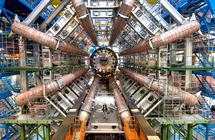Atom-smasher down for two months:
Hiu Min Neo
GENEVA (AFP) - The world's largest atom-smasher has been shut down for two months following a helium leak, just ten days after it was switched on amid great fanfare to probe the secrets of the universe.

CERN said in a statement that a fault occurred on Friday afternoon, resulting in a "large helium leak into the tunnel.
"Preliminary investigations suggest that the most likely cause of the problem was a faulty electrical connection between two magnets, which probably melted at high current leading to mechanical failure," it said.
There was no risk to people, added the centre, saying that a full probe was underway.
"There are people in the tunnel right now, we'll be giving updates as soon as we can," said Gillies.
The Large Hadron Collider (LHC) was started on September 10, with physicists cheering the successful testing of a clockwise beam, comprising strings of protons, and then an anticlockwise beam in preparatory testing ahead of first collisions.
But the LHC had to be shut down a week later due to an electrical hitch that affected a cooling system for high-powered magnets designed to steer beams of particles around the LHC's 27-kilometre (16.9-mile) circular tunnel.
The cooling system is important as the steering magnets in the LHC tunnel are chilled to as low as -271 degrees Celsius (-456.25 degrees Fahrenheit), which is close to absolute zero and colder than deep outer space.
At this extreme temperature, electrical currents overcome resistance, thus making it easier and cheaper to power electro-magnets.
The LHC was only turned back on again on Friday, but the latest setback has once again forced operations to halt.
As the sector where the fault occurred would have to be warmed up from its extreme temperature for repairs to take place, the LHC would now be halted for "a minimum of two months," resulting in further delays to the first collisions.
The LHC took nearly 20 years to complete and at six billion Swiss francs (3.76 billion euros, 5.46 billion dollars) is one of the costliest and most complex scientific experiments ever attempted.
It aims to resolve some of the greatest questions surrounding fundamental matter, such as how particles acquire mass and how they were forged in the "Big Bang" that created the universe some 13.7 billion years ago.
Counter-rotating beams are whizzed around the tunnel and then are smashed together in four huge laboratories.
Over the 10-15 years in which the LHC will operate, masses of data will spew from these collisions and will be scrutinised by physicists around the world.
The Holy Grail will be finding a theorised component called the Higgs Boson, which would explain how particles acquire mass. Also dubbed the "God particle," the Higgs is believed to be ubiquitous but has also been elusive until now.